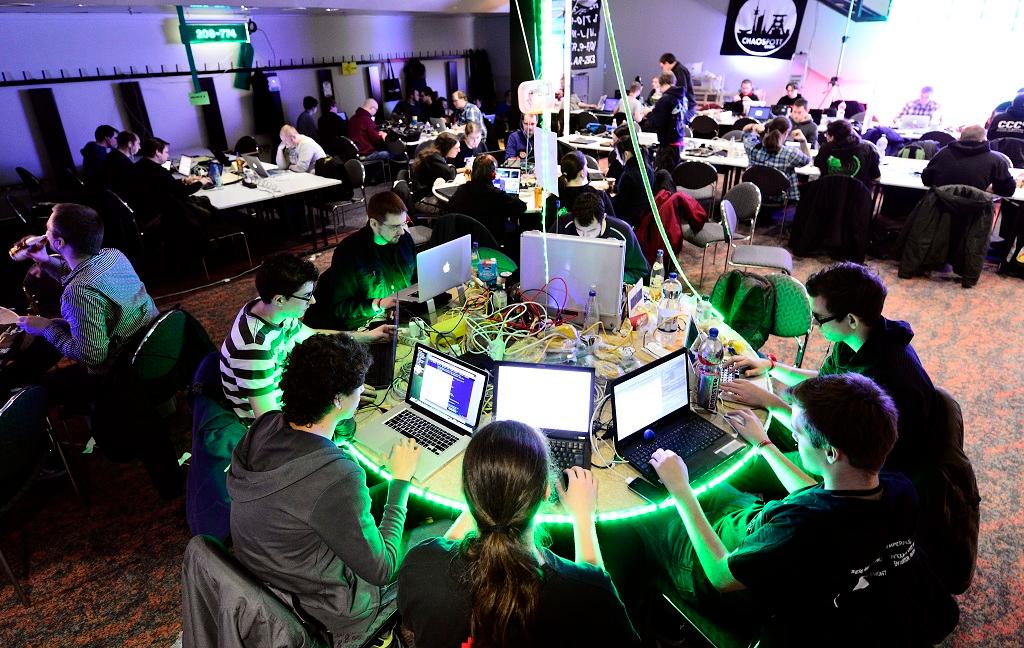US Defense Department ramps up recruitment for cyber army
Participants work at their laptops at the annual Chaos Computer Club (CCC) computer hackers’ congress, called 29C3, on December 28, 2012 in Hamburg, Germany. The 29th Chaos Communication Congress (29C3) attracts hundreds of participants worldwide annually to engage in workshops and lectures discussing the role of technology in society and its future.
In a major expansion of the US Defense Department’s Cyber Command, the Pentagon reportedly plans to recruit thousands of code crackers, online security professionals and even hackers to deploy the nation’s largest ever cyber army.
The command will recruit an additional 4,000 troops and civilians in the expansion of Cyber Command’s personnel to respond to the growing threat of cyber espionage, state-sponsored cyber-attacks and hacker collectives, The Washington Post reported.
“Given the malicious actors that are out there and the development of the technology, in my mind, there’s little doubt that some adversary is going to attempt a significant cyber-attack on the United States at some point,” William J. Lynn III, a former deputy defense secretary who helped fashion the Pentagon’s cyber security strategy, told The Post.
“The only question is whether we’re going to take the necessary steps like this one to deflect the impact of the attack in advance or… read about the steps we should have taken in some post-attack commission report,” he added.
More from GlobalPost: Google defies law enforcement
Pentagon officials and defense contractors have established cyber camps, competitions, scholarships and internships for high school and college students in addition to creating cyber security training programs for veterans returning from Iraq and Afghanistan, according to Huffington Post.
"The people do not exist at all," said Alan Paller to Huffington Post, director of the SANS Institute, a training organization for computer security professionals.
"A program is underway to build a pipeline of the needed people very rapidly,” he added.
The efforts by the Defense Department to train cyber soldiers are an attempt to address the shortage of personnel with the training and knowledge to fight in the digital battlefield. A part of the recruiting efforts will focus on hiring hackers, reported the Huffington Post, especially at global hacker conferences like DefCon where US officials mingle with some of the world’s most prolific code crackers.
The US’ first divisions of cyber soldiers won’t only focus on defense; they will also aid field commanders by bolstering ground offensives with cyber-attacks. While conventional ground forces engage an enemy, cyber warriors could be behind the lines, attempting to bring down the enemy's technology guiding weapons, munitions and troop movements.
More from GlobalPost: Kim Dotcom's Mega site launch mired in controversy
The “combat mission forces," one of three divisions of the Cyber Command, will aid field commanders by executing cyber-attacks alongside conventional military offensives.
"This new class of cyber warrior would be responsible for penetrating the machines behind identified attack sources, installing spyware to monitor connections to those machines, and following the trail back to the desktop of the attacker. They would have to research and exploit vulnerabilities, craft malware, operate honey pots, and even engage in targeted Denial of Service attacks," Richard Stiennon, author of Surviving Cyberwar and chief research analyst at IT-Harvest, told GlobalPost.
The “national mission forces” will protect networks and systems that govern the country’s electricity infrastructure and the “cyber protection forces” will focus solely on securing networks and systems operated by the Defense Department.
But such a force of cyber warriors won’t require that IT experts be deployed along battle lines. In fact, some of those hired by US Cyber Command may only be doing the work of an office IT professional with a security clearance.
“The Pentagon has a very broad definition of 'cyber' and there is often confusion over the difference between an IT security administrator and a cyber warrior,” said Stiennon.
"Since the Pentagon employs over 2 million people and probably is responsible for a million desktops, servers, and routers it is easy to understand that they could employ an additional 4,000 people to maintain those devices just from a patch management and security administration standpoint," he added.
Last fall, Defense Secretary Leon Panetta warned that the US was facing a “cyber-Pearl Harbor” as the country grew increasingly vulnerable to cyber-attacks launched by state actors. Such cyber-attacks could derail the nation’s power grid, financial networks, government systems and transportation infrastructure.
“An aggressor nation or extremist group could use these kinds of cyber tools to gain control of critical switches,” Panetta said.
“They could derail passenger trains, or even more dangerous, derail passenger trains loaded with lethal chemicals. They could contaminate the water supply in major cities, or shut down the power grid across large parts of the country.”
Don't polish your cyber armor yet.
A senior Pentagon official told Foreign Policy magazine that the program has not formally been given a green light yet.
"There is no doubt that we will expand our [cyber] forces; everyone is on the same page with that," the official said. "Exactly what the figures are, what they're called, and their precise makeup, that does remain to be seen. So in concept yes, we're expanding it. Has it happened on paper yet? No."
More from GlobalPost: Anonymous targets Mexico in defense of the Zapatistas
Every day, reporters and producers at The World are hard at work bringing you human-centered news from across the globe. But we can’t do it without you. We need your support to ensure we can continue this work for another year.
Make a gift today, and you’ll help us unlock a matching gift of $67,000!
